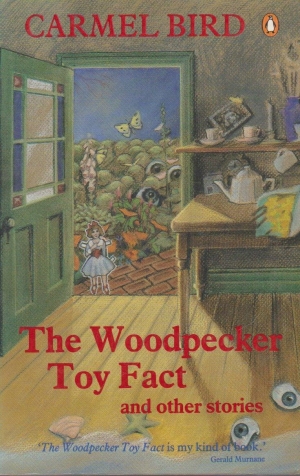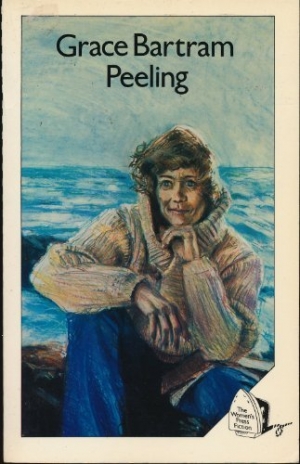Archive
Christina Thompson reviews 'The Woodpecker Toy Fact and Other Stories' by Carmel Bird
About a year ago, when The Woodpecker Toy Fact and Other Stories was just a gleam in its author’s eye, I chanced to hear this very fancifully dressed woman read a story about childhood perception, semantic confusion, and small-town gossip. It was one of those welcome breaks at an academic conference, when we turned our attention from the analysis of art to the thing itself. And it was perhaps the context, along with the exceptional performance of the reader, which made this particular story stand out so vividly. For while it satisfied, they (by then quite desperate) desire to be enthralled by something fictive, it also played up cleverly to the critic in us all.
... (read more)Ally is fifty-four when her husband leaves her. Her best friend and her daughter – neither of whom she has ever really talked to before – are each thousands of miles away. She descends rapidly into an undignified breakdown. Retreating from everyone and everything, she grows increasingly fat and fearful. Ally has never been terribly confident in her own identity (‘People tend to look past her, rather than at her. Shop assistants tend to give her bored glazed looks and a sharp “What?”’) and now, unloved and unneeded, she is threatened with disintegration. The woman in the mirror is a stranger, she imagines herself as a white grub that she can make vanish by closing her eyes.
... (read more)Brenda Walker reviews 'The Walls of Jericho' by Julie Lewis and 'The Wild Dogs' by Peter Skrzynecki
At various times in its history, the Australian short story has been predictable, as editorial and public appetites have limited experimentation. I am glad to be reading now, when approval can be conferred on collections as different and as variously excellent as Julie Lewis’s The Walls of Jericho and Peter Skrzynecki’s The Wild Dogs. Lewis’s work is more formally experimental than Skrzynecki’s, but both collections offer insight into the social and the literary.
... (read more)Vane Lindesay reviews 'The Creative Spirit in Australia: A Cultural History' by Geoffrey Serle
The perennial and increasingly tiresome question of Australian ‘national identity’ will probably diminish rapidly after the point where the design of a new and truly Australian flag is determined.
That it is a question at all, after just on two hundred years of settlement here, is curious. Part of the condition was diagnosed by the late Arthur Phillips in his studies of our colonial culture, The Australian Tradition, where he perceived in this country what he termed ‘the cultural cringe’. Phillips’ book, together with Vance Palmer’s The Legend of the Nineties and Russel Ward’s The Australian Legend, were emancipating surely.
... (read more)John Carmody reviews 'Melba: The voice of Australia' by Thérèse Radic and 'Bernard Heinze: A biography' by Thérèse Radic
Disraeli considered that biography – in contrast to history – is life without theory, though the result of such a policy can be arid. It needs, as well, to be portrayal without betrayal, but it more often errs in the opposite direction: who is likely to write about someone for whom she or he feels an antipathy or an indifference? Yet I am inclined to think that there is a case to be made for ‘arranged biography’, analogous to the ‘arranged marriages’ of other times and cultures.
... (read more)Matthew Harding reviews 'A Formula for Glass' by Michael Sariban
Michael Sariban has provided us with a new and memorable collection of poetry. In 1984, the Queensland Community Press produced At the Institute for Total Recall, which met with an enthusiastic response.
... (read more)Rita Erlich states that Good Enough to Eat is ‘a guide to some of the best foods in Melbourne’. It is that indeed and a very good one – and fun to read as well. But it has much more than a provincial value. Since Australian Book Review is a national journal, it is worth stressing that this book gives invaluable advice that is applicable anywhere – how to shop, what to look for, how to judge this or that purveyor, above all what questions shoppers should ask not only of the sellers but of themselves.
... (read more)Barry Dickins reviews 'The D Generation Bumper Book of Aussie Heroes' by John Alsop, Santo Cilauro, Tom Gleisner, Andrew Knight, Rob Sitch, and Magda Szubanski
It’s finally happened. I’m not funny. All my life I’ve been told I’m a ratbag. I’m a maniac. I need help. I see life different. Hint of lunacy in the blood. Touch of madness in the haircut. Dickins, he’s crazy. Dickins, he thinks like the turn-off to Shepparton.
... (read more)I don’t usually reply to Letters to the Editor, but … Since this lot (see opposite) is particularly atrabilious, a lovely word I have just learned from Don Anderson, I feel moved to make a few mild replies. Ken Gelder and Gerard Windsor are big boys now and can look after themselves, but I will say that John Carroll’s is the only negative response I have seen or heard to Windsor’s June Self Portrait (there were lots of positive ones, although Gerard did get a tad upstaged by his small son). I should also like to point out to John Carroll that Norman Mailer was reduced to his correct proportions years ago (‘brought down’, if you will – funny how Mailer’s name irresistibly suggests these metaphors of detumescence) by an assortment of immortal feminists who most certainly do not need any help from me, and as far as I am concerned the basic difference between Norman Mailer and John Hooker is that John Hooker is a serious human being. If I did indeed take a tone of unbecoming admonition, it seems to me that John Carroll has caught it; there’s a lurking sub-text to his letter best expressed as ‘Naughty girl, silly girl, stop it now or Daddy will smack.’
... (read more)Reading My Place by Sally Morgan reminds one of how powerful a book can be when there is an urgent story to be told. This book, let me say at the outset, is wonderful.
Sally Morgan and her four brothers and sisters grew up in Perth in the 1950s and 1960s. They are part Aboriginal, but didn’t know it then. They knew they were darker, different, perhaps they were Greek; their mother and grandmother told them they were Indian and this answer satisfied the kids at school, and them for a time.
... (read more)








